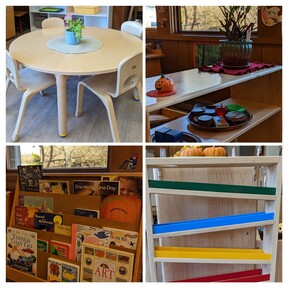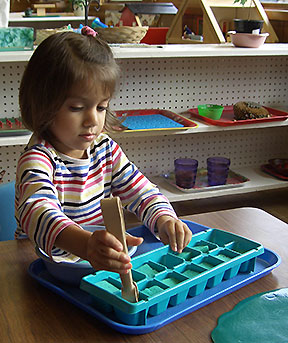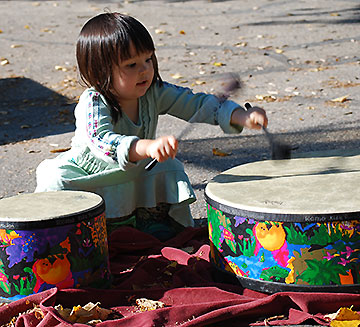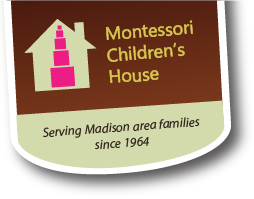Toddler Program
Age 18 months to 3 years (8:30-12:00, Monday through Friday)
A Montessori Environment for Toddlers
Like the pre-primary (preschool) class for 3-6 year olds, the room is divided into "curriculum areas" with activities sequenced by type and complexity, but for toddlers, the curriculum is both simplified and more open-ended. There is a large area which corresponds to the Practical Life area in the preschool, where children practice motor control while they acquire the sense of order and concentration to perform everyday tasks that help them achieve that largest of goals for toddlers: INDEPENDENCE! Another part of the room has materials that encourage exploration of spatial concepts, which is like the Sensorial Area in the preschool, but whose activities have fewer and less subtle distinctions, and are made for the rougher usage of single-minded toddler physicists. There are indoor as well as outdoor opportunities for gross motor practice and exploration: jumping, climbing, sliding, crawling. Toddlers are not only building their skills and strength, but learning more about their bodies' separateness from the rest of their environment. There's room for pretend play and the beginnings of socialization, and time and patience for all those things that toddlers want to be able to do on their own -- taking off (and maybe putting on!) shoes, opening containers, getting dressed, eating independently, toileting, experimenting with the way things interact. The limits of what is acceptable in the class are related to safety and the needs of others, but not determined primarily by what would be convenient, or sometimes even preferable, to the adults in the class. The developmental needs of the children come first.
 Toddlers need to have as much freedom as possible to experience a safe version of the world and to experiment with the effects their actions have on that world. They need repeated experience in order to build the concepts and the conservation skills that will enable them to generalize their experience appropriately and take the concepts that they've learned to the next level. They need people, an environment and a schedule that they can count on for the security that allows them to feel comfortable reaching out to new experiences. This is what is known as a "prepared environment" in a Montessori Toddler Class: a place that has been carefully prepared for a toddler to meet many of his or her developmental needs independently, with support and guidance from the adults.
Toddlers need to have as much freedom as possible to experience a safe version of the world and to experiment with the effects their actions have on that world. They need repeated experience in order to build the concepts and the conservation skills that will enable them to generalize their experience appropriately and take the concepts that they've learned to the next level. They need people, an environment and a schedule that they can count on for the security that allows them to feel comfortable reaching out to new experiences. This is what is known as a "prepared environment" in a Montessori Toddler Class: a place that has been carefully prepared for a toddler to meet many of his or her developmental needs independently, with support and guidance from the adults.
The adults in this class have three main functions: to prepare a rich, developmentally appropriate learning environment; and to observe sensitively and knowledgeably so as to do a better job with the other two functions. While we may be delighted and amused by watching many of the things the toddlers do, we take them very seriously and treat them with the respect  that the huge endeavors of the toddler year deserve. Suppose you were told that in the next year, you would have to develop a full range of new physical skills and acquire a new language, learn to get along with people completely dissimilar from yourself, learn molecular biology, engineering and physics, and become almost completely self-sufficient. Toddlers are driven to do all of these things at their own level, and the progress they make in one short year is amazing. No wonder they're too busy to stop and put stuff away!
that the huge endeavors of the toddler year deserve. Suppose you were told that in the next year, you would have to develop a full range of new physical skills and acquire a new language, learn to get along with people completely dissimilar from yourself, learn molecular biology, engineering and physics, and become almost completely self-sufficient. Toddlers are driven to do all of these things at their own level, and the progress they make in one short year is amazing. No wonder they're too busy to stop and put stuff away!
